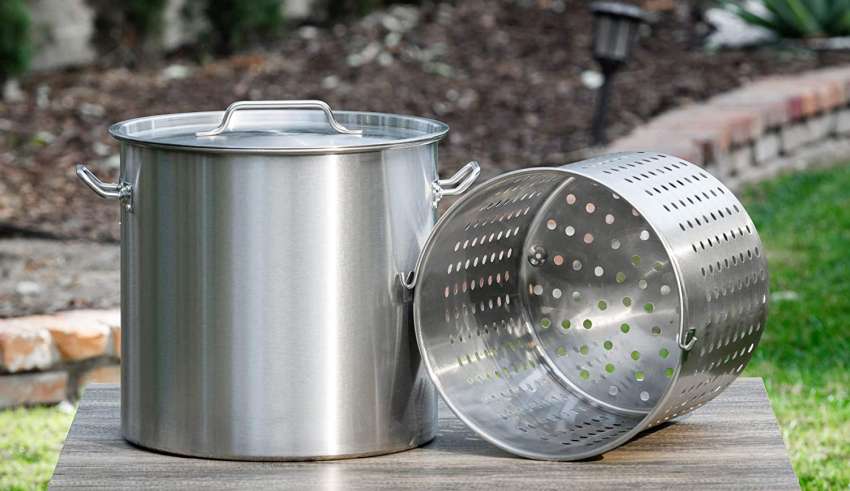Frying a turkey is one of the best ways to get a juicy, flavorful bird with crispy skin. But to fry turkey safely and easily you need the right equipment – specifically a turkey fryer pot with a spigot. This handy feature allows hot oil to be drained away from the pot after cooking.
In this comprehensive guide we’ll walk through everything you need to know to choose the perfect turkey fryer pot with spigot. You’ll learn about different types of pots sizes, features, and safety considerations.
What is a Turkey Fryer Pot with Spigot?
A turkey fryer is a large, heavy pot used for deep frying turkeys. Turkey fryer pots are typically made of aluminum or stainless steel, and hold around 5 gallons of oil.
The key feature that sets fryer pots apart is the spigot – a tap attached to the front of the pot. After frying the turkey, the spigot can be opened to drain hot oil away from the pot for safer disposal.
Benefits of Using a Turkey Fryer Pot with Spigot
There are several advantages to using a turkey fryer with spigot:
-
Safer oil draining – The spigot allows you to drain oil away from yourself into a disposal container. This prevents spilling and burns.
-
Precise temperature control – Fryer pots have built-in thermometers for monitoring oil temp. Proper temperature helps ensure the turkey cooks evenly.
-
Bigger birds – Fryer pots can accommodate turkeys up to 20 lbs, much larger than you can fry in a stockpot.
-
Faster cooking – The large amount of hot oil fries the turkey quickly, in about 3-4 minutes per pound.
Types of Turkey Fryer Pots
There are two main types of turkey fryer pots: propane and electric.
Propane Fryer Pots
Propane fryer pots are the most common type. They use a propane burner that attaches to a standard propane tank.
Pros:
- Very portable
- Produce high heat for fast frying
- Work anywhere with propane
Cons:
- Need to monitor propane tank levels
- Can be more difficult to control temperature
Electric Fryer Pots
Electric fryer pots plug into a standard wall outlet. The oil is heated by internal electric heating elements.
Pros:
- Often have precise thermostat controls
- Don’t have to worry about running out of propane
Cons:
- Less portable due to cord
- Don’t get as hot as propane
What Size Turkey Fryer Pot Do You Need?
Turkey fryer pots come in different quart sizes, usually from 20 quarts up to 45 quarts.
Choose your pot size based on the weight of turkey you want to fry:
- 20 quart pot: 10-12 lb turkey
- 30 quart pot: 12-15 lb turkey
- 40+ quart pot: 15-20+ lb turkey
Allow about 5 quarts of oil per pound of turkey. Go with a pot that’s at least 10 quarts larger than your turkey.
Tip: Buy the largest pot that fits your needs – the extra room prevents oil overflow.
Key Features to Look For
-
Spigot – The whole point of a fryer pot! Look for a sturdy, easy to use spigot.
-
Thermometer – Accurate oil temp is crucial. Seek pots with large, clear thermometers.
-
Sturdy handles – Needed to safely lower turkey in and out of hot oil.
-
Basket – Makes lowering the turkey easier. Not essential but very useful.
-
Flat bottom – Allows the pot to sit level on propane burners.
-
Drain tray – Catches oil from the spigot for cleaner draining.
Top Turkey Fryer Pots with Spigots
Based on key features, performance, and value, here are our top picks:
-
Bayou Classic Stainless Steel Turkey Fryer – 30 qt pot with aluminum basket and perforated lift. Durable stainless steel Distributes heat evenly.
-
Char-Broil Big Easy Oil-Less Turkey Fryer – 16 qt infrared oil-less fryer. Safer and less messy than traditional frying.
-
Masterbuilt XXL Propane Turkey Fryer – Huge 40 qt aluminum pot. Comes with digital thermostat, lifting hook, and drain valve.
-
Butterball XL Electric Turkey Fryer – 32 qt electric fryer with digital controls and wood chip box for infusing smoke flavor.
-
King Kooker Propane Turkey Fryer – Budget-friendly 33 qt propane fryer with turkey rack and lifting tool. Simple design.
Turkey Fryer Pot Safety Tips
While incredibly tasty, frying turkey comes with some inherent dangers. Follow these tips for safe frying:
-
Fry outdoors away from structures on a flat surface. Do not leave the fryer unattended.
-
Do not overfill the pot with oil. Follow fill line markers.
-
Slowly lower and raise the turkey to prevent burns. Wear protective gloves.
-
Keep children and pets away from the hot oil.
-
Monitor oil temp carefully to prevent overheating.
-
Completely thaw turkey before frying to prevent hot oil spatter.
-
Use potholders when opening spigot and disposing of oil.
With the right turkey fryer pot featuring a spigot, you’ll be able to enjoy perfectly fried turkey with maximum flavor and minimum hassle. Just be sure to prioritize safety through every step of the process. Happy frying!

Barton Deluxe 30 QT Aluminum Turkey Deep Fryer Pot Boiling Lid 37,000 BTU 95528 turkey
FAQ
What kind of pot do you use to fry a turkey?
Can you use a turkey fryer on a deck?
Do I cover the pot when deep frying a turkey?
How big of a turkey can you fry in a 32 quart pot?
